Hardliners overwhelmingly dominate the candidate pool for the upcoming Iranian presidential election. The registration period for the election ended on June 3, and 80 individuals registered to compete in the election.[i] The Guardian Council—a regime body responsible for supervising elections and approving candidates—will vet candidates between June 4 and 10, and the Interior Ministry will then announce the final list of presidential candidates on June 11.[ii] The Guardian Council has historically disqualified moderate and reformist figures to advantage hardline candidates.[iii]
The following individuals registered between June 1 and 3:
Mohammad Bagher Ghalibaf.[iv] Ghalibaf is a hardline politician who has served as Iran’s parliament speaker since 2020.[v] Parliamentarians recently re-elected Ghalibaf as parliament speaker on May 28.[vi] Ghalibaf is a long-time member of the Islamic Revolutionary Guards Corps (IRGC), having served as the IRGC Air Force commander between 1997 and 2000.[vii] He is a very well-connected politician who maintains close personal relationships with the highest echelons of the IRGC dating back to the Iran-Iraq War.[viii] Ghalibaf also served as Iran’s police chief between 2000 and 2005.[ix]
Vahid Haghanian.[x] Haghanian is a close aide to Supreme Leader Ali Khamenei. Haghanian serves as Khamenei’s Executive Deputy and Deputy for Special Affairs and acts as a liaison between Khamenei’s office and senior Iranian politicians.[xi] Iranian media noted on June 3 that Haghanian has “always been present in the Supreme Leader’s inner circle.”[xii] The US Treasury Department sanctioned Haghanian in 2019 for acting on behalf of Khamenei’s office and noted that Haghanian “has been referred to as the Supreme Leader’s right hand.”[xiii] The US Treasury Department added that Haghanian is a former military commander and usually accompanies Khamenei on social engagements.[xiv] Haghanian emphasized on June 1 that it was his “personal decision” to register for the upcoming presidential election.[xv]
Zohreh Elahian, Hamida Zarabadi, and Hajar Chenarani.[xvi] Three women registered for the upcoming presidential election. The Guardian Council has never allowed a woman to compete in a presidential election.[xvii] Elahian is a hardline politician and a former member of the Parliamentary National Security and Foreign Policy Committee.[xviii] The Canadian government sanctioned Elahian in March 2024 for supporting the dealth penalty of protesters involved in the Mahsa Amini movement.[xix] Zarabadi is a reformist politician who represents Qazvin Province’s Qazvin, Abyek, and Alborz districts in Parliament.[xx] Zarabadi stated on June 3 that her cabinet would be composed of men and women representing every ethnicity, religion, and class if she became president.[xxi]
Mehrdad Bazrpash and Mohammad Esmaili.[xxii] Two current Ebrahim Raisi administration officials registered for the upcoming presidential election. Bazrpash currently serves as Iran’s roads and urban development minister and Esmaili serves as Iran’s culture and Islamic guidance minister. Bazrpash previously headed Iran’s two largest car manufacturing companies, SAIPA and Pars Khodrow.[xxiii] The United States, the United Kingdom, Australia, and Canada announced coordinated sanctions against Esmaili on the anniversary of Mahsa Amini’s death in September 2023 for his role in enforcing the mandatory veiling law.[xxiv]
Ali Reza Zakani.[xxv] Zakani is a hardline politician who has served as the mayor of Tehran since 2021.[xxvi] The Guardian Council barred Zakani from running in the 2013 and 2017 presidential elections.[xxvii] Zakani competed in the 2021 presidential election but ultimately withdrew his candidacy in support of Raisi.[xxviii] Zakani previously headed the Student Basij Organization during the crackdown on student protesters in July 1999.[xxix]
Eshaq Jahangiri.[xxx] Jahangiri is a reformist politician who served as Iran’s first vice president under former President Hassan Rouhani between 2013 and 2021.[xxxi] Jahangiri withdrew from the 2017 election in support of Rouhani.[xxxii] The Guardian Council barred Jahangiri from competing in the 2021 presidential election.[xxxiii]
Mahmoud Ahmadinejad.[xxxiv] Ahmadinejad is a hardline politician who served as Iran’s president between 2005 and 2013.[xxxv] The Guardian Council barred Ahmadinejad from competing in the 2017 and 2021 presidential elections.[xxxvi]
Iran is continuing to increase its enriched uranium stockpile, according to a statement by International Atomic Energy Agency (IAEA) Director General Rafael Grossi during an IAEA Border of Governors meeting on June 3.[xxxvii] Grossi stated that the IAEA had not been able to access Iranian nuclear sites for over three years and that Iran had made no progress in resolving outstanding safeguards issues. Safeguards are IAEA activities that enable the IAEA to verify that a state is not using its nuclear programs for nuclear-weapons purposes.”[xxxviii] Grossi added that “public statements made in Iran” made about Iran’s ability “to produce nuclear weapons and possible changes to Iran’s nuclear doctrine” increased his concerns about the “correctness and completeness of Iran’s safeguards declarations.”[xxxix] Iranian officials have increasingly normalized discussions about Iran’s ability to procure a nuclear weapon in recent months, as CTP previously reported.[xl]
The Associated Press cited a confidential IAEA report on May 27 that reported that Iran increased its stockpile of 60 percent enriched uranium from 121.5 kilograms to 142.1 kilograms (a 16.95 percent increase).[xli] Weapons-grade uranium is uranium that is enriched to 90 percent purity. A US expert noted on May 28 that, based on the confidential IAEA report, Iran could produce enough weapons-grade uranium (WGU) for almost eight nuclear weapons in the first month after breakout.[xlii]
Israeli Prime Minister Benjamin Netanyahu said on June 3 that Israel will not agree to a permanent ceasefire until Israel achieves its war objectives.[xliii] US President Joe Biden outlined the latest Israeli ceasefire proposal and encouraged both Hamas and Israel to accept it during a speech on May 31.[xliv] He said that the proposal includes an initial six-week ceasefire with a partial Israeli military withdrawal and the release of some hostages while Hamas and Israel negotiate a permanent end to hostilities.[xlv] Netanyahu said on June 3 that Biden’s outline of the proposal was only “partial.”[xlvi] Israel has confirmed that it approves the proposal that Biden outlined but insisted that a permanent ceasefire is only possible once Israel achieves its war objectives.[xlvii] Two right-wing members of Netanyahu‘s coalition have threatened to dissolve the Israeli government if Netanyahu agrees to end the war.[xlviii] Netanyahu said that Israel is insisting that a second phase of the ceasefire can begin only after there is an agreement on the terms of the complete ceasefire.[xlix] This would allow Israel to retain the right to resume fighting in the Gaza Strip as long as Israel views that the negotiations are futile. Netanyahu said during a closed-door parliamentary meeting that Israel could initiate the first phase of the proposal without an agreement on what follows.[l]
Hamas official Suheil al Hindi told The Washington Post on June 3 that Hamas is still discussing the ceasefire proposal that Biden presented.[li] Hamas told international mediators that it wants a detailed proposal that reflects the one Biden presented in his speech.[lii] Hamas officials told international mediators that the latest Israeli proposal described a period of “sustainable calm“ in ambiguous terms, suggesting that Hamas was not confident that the “sustainable calm“ would secure Hamas‘ key demand, a permanent ceasefire.[liii] Hamas stated on May 31 that it is willing to engage “positively and constructively” with the latest Israeli ceasefire proposal, so long as it meets Hamas’ maximalist demands.[liv] Qatar sent the Israeli proposal to Hamas on May 30.[lv] A senior US official mentioned that the proposal is “nearly identical” to one presented by Hamas three weeks prior before that proposal was unilaterally altered by Egyptian intelligence.[lvi] Hamas has not issued an official response to the Israeli proposal at the time of writing.
Hamas may reject the agreement if the agreement fails to secure Hamas’ maximalist objectives, which include a permanent ceasefire. Hamas remains confident that it can survive Israeli military operations in the Gaza Strip, and it can therefore pursue its maximalist demands without major concessions. CTP-ISW has previously noted that Hamas’ confidence in its survival increased, and its ceasefire demands appear to have solidified as the IDF drew down its forces in the Gaza Strip beginning in late December 2023.[lvii] Hamas leader in the Gaza Strip Yahya Sinwar expressed confidence in February 2024, stating that Hamas is “doing fine” amid Israeli clearing operations.[lviii] Sinwar conveyed to Arab mediators in early May 2024 that he is in no hurry to end the war, as it is drawing international condemnation of Israel and reviving the Palestinian national cause.[lix]
US Secretary of State Antony Blinken spoke with Israeli Defense Minister Yoav Gallant and War Cabinet member Benny Gantz on June 2.[lx] Blinken commended Israel for its latest ceasefire proposal and emphasized that Hamas should accept the deal without delay.
Israeli Defense Minister Yoav Gallant said on June 2 that Israel is assessing an alternative governing authority to Hamas in the Gaza Strip.[lxi] Gallant stated that Israel will isolate areas in the Gaza Strip, remove Hamas operatives, and bring in other forces to enable an alternative government. He emphasized that Israel will not accept Hamas’ rule.[lxii] Hamas will violently resist and undermine alternative governing authorities that do not include it. An Israeli intelligence source confirmed on June 1 that Hamas killed the head of a local clan in the Gaza Strip, disrupting an Israeli plan to replace Hamas as the primary governing authority.[lxiii]
Key Takeaways:
- Iranian Presidential Elections: Hardliners overwhelmingly dominate the candidate pool for the upcoming Iranian presidential election. Current Parliament Speaker and former IRGC Air Force commander Mohammad Bagher Ghalibaf and close Khamenei aide Vahid Haghanian both registered for the election between June 1 and 3.
- Ceasefire Negotiations: Israeli Prime Minister Benjamin Netanyahu said that Israel will not agree to a permanent ceasefire until Israel achieves its war objectives. Hamas may reject the agreement if the agreement fails to secure Hamas’ maximalist objectives, which include a permanent ceasefire.
- Post-War Gaza Strip: Israeli Defense Minister Yoav Gallant said on June 2 that Israel is assessing an alternative governing authority to Hamas in the Gaza Strip. Hamas will violently resist and undermine alternative governing authorities that do not include it.
- West Bank: Palestinian fighters continue to seek to attack Israeli towns from the West Bank.
- Northern Israel: An Israeli Army Radio correspondent reported on June 3 that the IDF faces challenges intercepting drones targeting northern Israel. Other military forces, including the US Army, have also encountered challenges combatting Iranian-made drones in the Middle East.
- Yemen: The Houthis likely launched a ballistic missile from the Red Sea targeting Israel on June 3. The IDF’s Arrow ballistic missile defense system intercepted the Houthi missile.
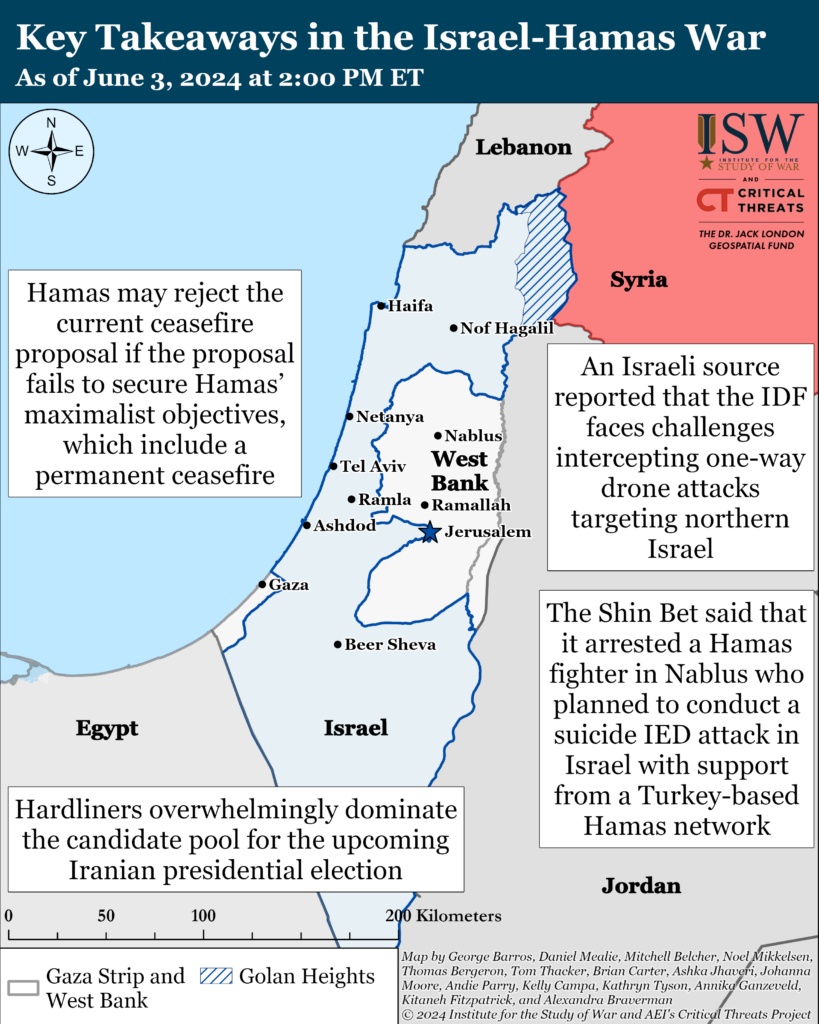
Gaza Strip
Axis of Resistance objectives:
Erode the will of the Israeli political establishment and public to sustain clearing operations in the Gaza Strip
Reestablish Hamas as the governing authority in the Gaza Strip
The Israel Defense Forces (IDF) conducted clearing operations north of the Netzarim Corridor near Sabra and Zaytoun on June 3.[lxiv] The IDF announced on June 1 that it launched a raid into the Sabra and Zaytoun neighborhoods of Gaza City.[lxv] The IDF 99th Division is currently operating along the Netzarim Corridor.[lxvi] The IDF uses the corridor to launch raids against Hamas fighters and infrastructure in the northern and central Gaza Strip. The IDF 679th Brigade (99th Division) directed strikes on Palestinian sniper positions and located a munitions warehouse containing “dozens” of rocket components during operations in Sabra and Zaytoun.[lxvii] Israeli forces have conducted at least five separate operations in this area of southern Gaza City during the war.[lxviii] Palestinian fighters, including Hamas, targeted Israeli forces with rocket-propelled grenades and mortar fire in Sabra.[lxix] Palestinian fighters also targeted Israeli forces along the Netzarim Corridor with indirect fire.[lxx]
Israeli forces continued clearing operations in central Rafah on June 3. The IDF 89th Commando Brigade raided an “active combat complex” in Rafah.[lxxi] Israeli forces located tunnel shafts, and a weapons stash including long-range rockets, ”combat transmission systems,” and explosive charges.[lxxii] Israeli forces directed a drone strike on a Palestinian fighter during the raid.[lxxiii] The IDF Air Force also struck a separate Hamas weapons production site in Rafah.[lxxiv] Three Palestinian militias have mortared Israeli forces along the Egypt-Gaza Strip border since CTP-ISW’s last data cut off on June 2.[lxxv] Palestinian fighters targeted Israeli forces across Rafah Governorate with improvised explosive devices and rocket-propelled grenades.[lxxvi]
The IDF Air Force targeted over 50 Palestinian sites across the Gaza Strip on June 3.[lxxvii]
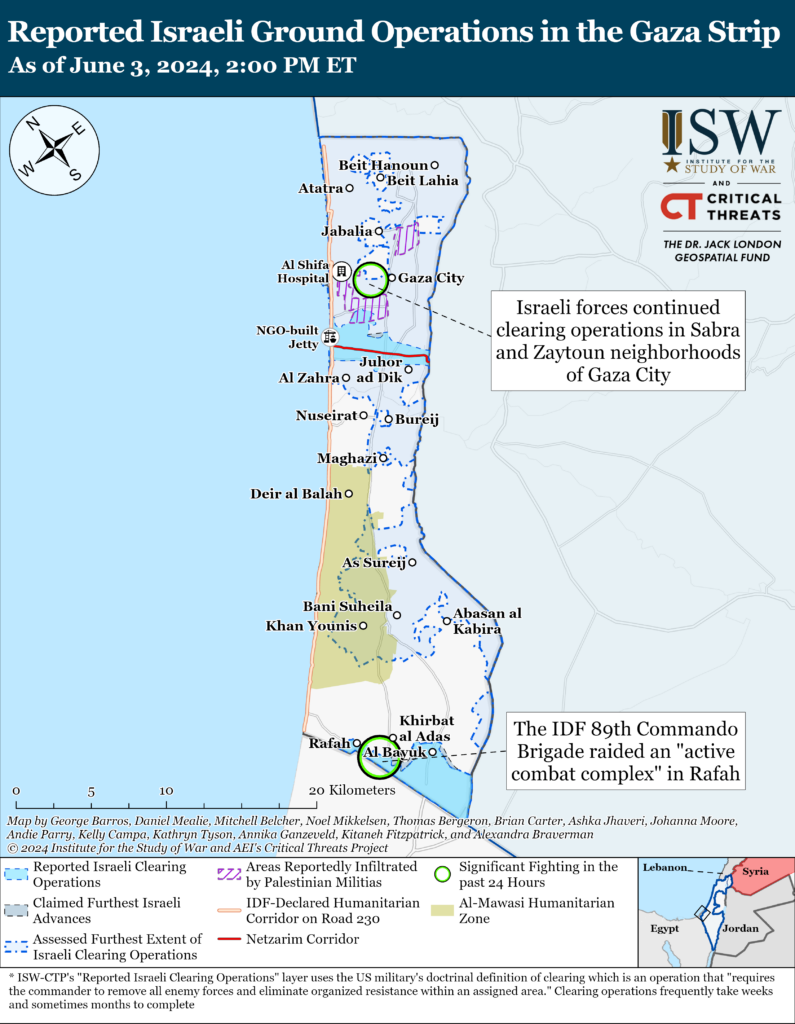
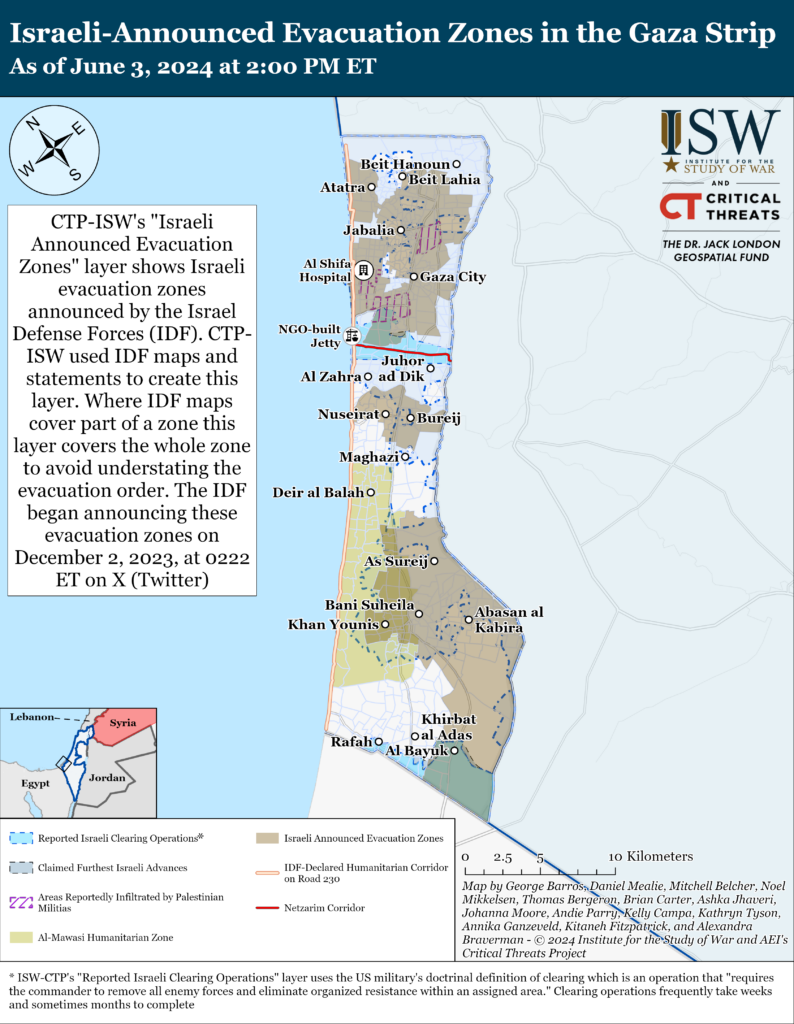
US, Israeli, and Egyptian officials discussed ways to reopen the Rafah border crossing during talks in Cairo on June 2.[lxxviii] Egyptian officials said that the three sides would continue discussions in the coming days, though the three negotiating parties have made little progress.[lxxix] Two Egyptian security sources told Reuters that Egypt is maintaining that Israel must withdraw from the Palestinian side of the Rafah crossing in order for the crossing to operate again.[lxxx] Unspecified US officials said that the United States will prioritize reopening the Rafah border crossing for aid deliveries, preventing Hamas from smuggling weapons from Egypt into the Gaza Strip, and ”maintaining a tenuous peace between Israel and Egypt.”[lxxxi]
The IDF announced on June 3 that four Israeli hostages died in captivity in the Gaza Strip.[lxxxii] Hamas abducted the Israelis during its October 7, 2023, attack and still holds their bodies.[lxxxiii] The IDF is examining the circumstances of their deaths, which occurred a few months ago in Khan Younis.[lxxxiv]
Palestinian militias did not conduct any indirect fire attacks from the Gaza Strip into Israel on June 3.
West Bank
Axis of Resistance objectives:
Establish the West Bank as a viable front against Israel
Israeli forces have engaged Palestinian fighters in at least six locations in the West Bank since CTP-ISW’s last data cut off on June 2.[lxxxv] The al Aqsa Martyrs’ Brigades fired small arms and detonated IEDs targeting Israeli forces in the Balata refugee camp in Nablus.[lxxxvi]
Palestinian fighters continue to seek to attack Israeli towns from the West Bank. The Israeli Shin Bet announced on June 3 that it arrested a Hamas fighter in Nablus in March 2024 who had planned to conduct a suicide IED attack in Israel.[lxxxvii] The fighter is originally from Tulkarm in the West Bank but had been based in Jordan. A Hamas member in Turkey recruited the fighter, according to the Shin Bet. The fighter underwent military training in an unspecified location and Hamas sent the fighter funding and instructions for the attack. The Shin Bet also detained several Hamas fighters from Nablus who the Shin Bet suspected helped to manufacture the IED.
This arrest underscores that Hamas and other Palestinian militias in the West Bank continue to maintain cells focused on attacking Israeli towns and cities outside the West Bank.[lxxxviii] Israeli forces killed a Palestinian man in Zeita, along the West Bank-Israel barrier, en route to conduct a suicide bombing in Tel Aviv in March.[lxxxix] Hamas and the al Aqsa Martyrs’ Brigades claimed three separate attacks targeting Bat Hefer, an Israeli town immediately adjacent to Tulkarm, in May.[xc] The al Aqsa Martyrs’ Brigade claimed that in one of the attacks their fighters entered Israel itself.
Palestinian Authority President Mahmoud Abbas publicly condemned a speech given by Iranian Supreme Leader Ali Khamenei on June 3.[xci] Khamenei’s June 3 speech praised the October 7 attacks.[xcii] Abbas said that Khamenei’s speech sought to “sacrifice Palestinian blood” and would not lead to the creation of a Palestinian state.[xciii]
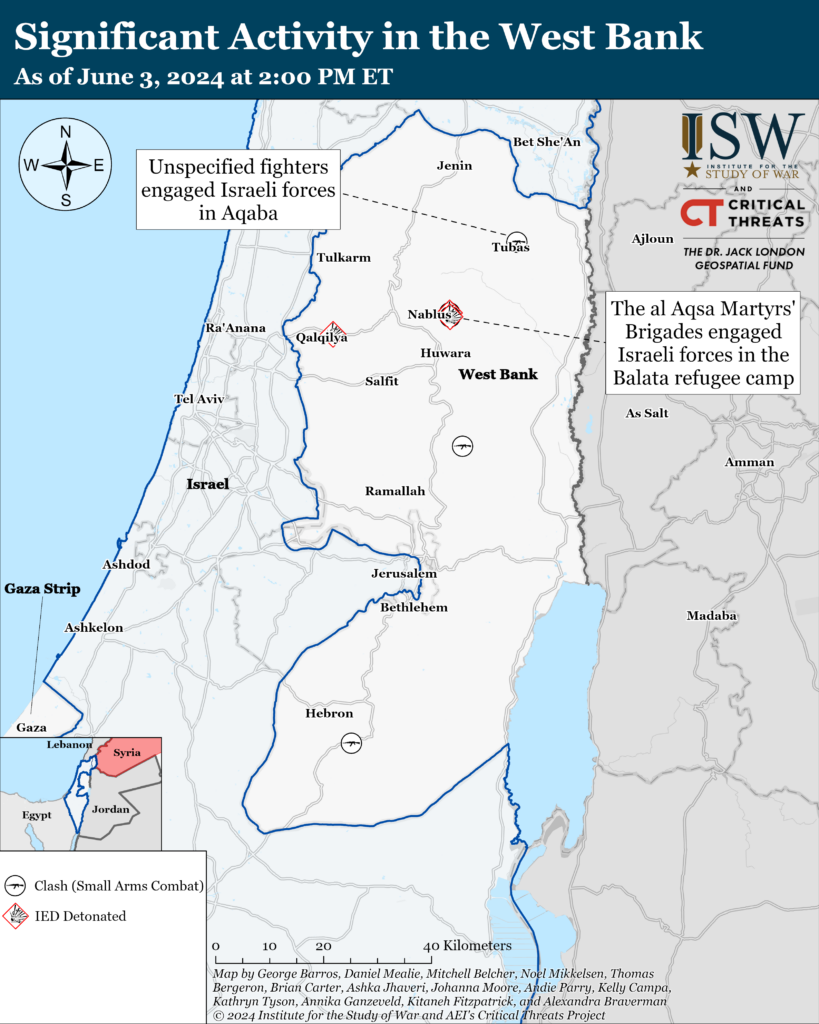
This map is not an exhaustive depiction of clashes and demonstrations in the West Bank.
Southern Lebanon and Golan Heights
Axis of Resistance objectives:
Deter Israel from conducting a ground operation into Lebanon
Prepare for an expanded and protracted conflict with Israel in the near term
Expel the United States from Syria
Lebanese Hezbollah has conducted at least 11 attacks into northern Israel since CTP-ISW’s last data cutoff on June 2.[xciv] Hezbollah conducted three one-way drone attacks targeting Israeli forces in northern Israel during the reporting period.[xcv]
An Israeli Army Radio correspondent reported on June 3 that the IDF faces challenges intercepting drones targeting northern Israel. Other military forces, including the US Army, have also encountered challenges combatting Iranian-made drones in the Middle East.[xcvi] The correspondent said that the IDF is working to improve technological and defensive capabilities to resolve these challenges. The challenges of defending against drone attacks have emerged in other areas in the Middle East. The US Army faced persistent one-way drone attacks from Iranian-backed militias in Iraq and Syria between 2023 and 2024.[xcvii] The IDF’s experience in northern Israel bears several similarities to the US Army’s experience in Iraq and Syria in 2023 and 2024. Both the IDF and the US Army defend fixed positions under fire from one-way attack drones manufactured by or with assistance from Iran that targeted US positions in Iraq and Syria and IDF positions in northern Israel in ones and twos, for example.[xcviii]
An Israeli research center reported on June 2 that Hezbollah has significantly increased its drone attacks against Israel since the Israel-Hamas war began in October 2023.[xcix] The report is consistent with CTP-ISW’s data on Hezbollah drone attacks targeting northern Israel. Hezbollah more than doubled its drone attacks between April and May 2024.[c]
The Israeli Air Force conducted an airstrike that killed a Hezbollah engineer in Tyre, southern Lebanon, on June 3.[ci] The IDF said the engineer, Ali Hussein Sabra, improved and equipped Hezbollah air defenses.[cii] The Israeli Air Force also struck several military compounds that Hezbollah used for its air defense systems in Qotrani, southern Lebanon.[ciii] Hezbollah mourned the death of Sabra on June 3.[civ]
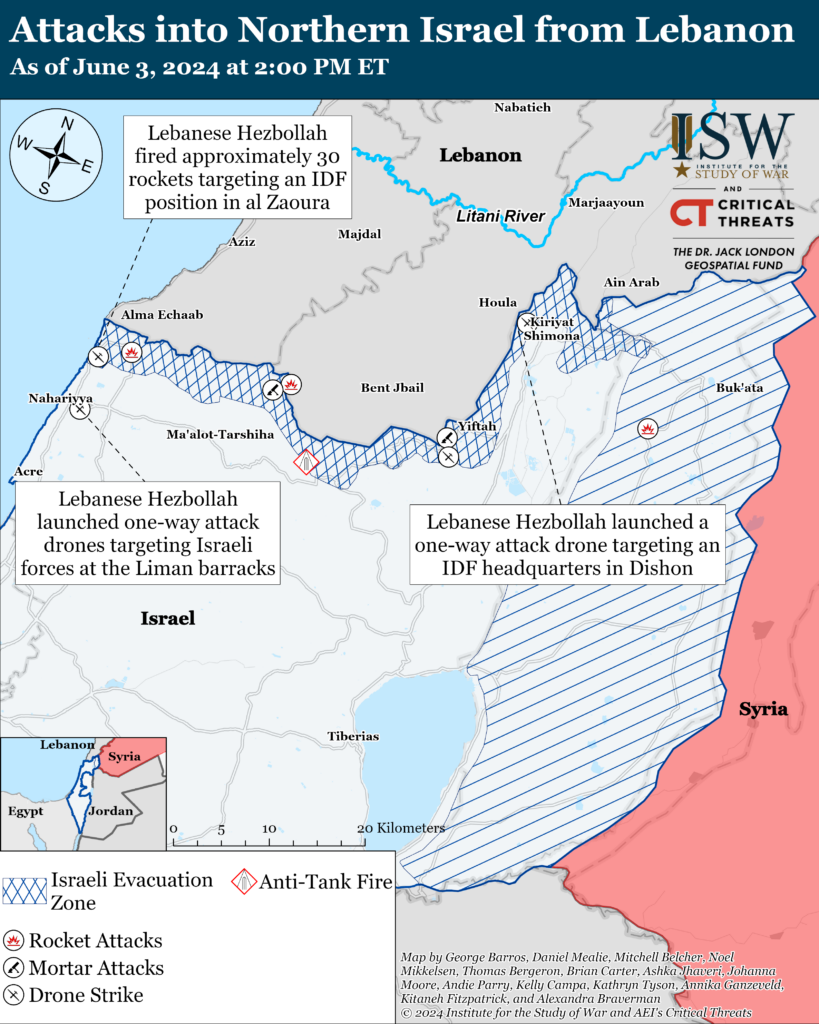
Recorded reports of attacks; CTP-ISW cannot independently verify impact.
Iran and Axis of Resistance
Israel likely conducted an airstrike that targeted Iranian-backed militia infrastructure north of Aleppo, Syria and killed IRGC advisor Saeid Abyar on June 3. The Syrian Ministry of Defense reported that Israel conducted an airstrike targeting multiple sites near Aleppo.[cv] Syrian sources reported that Israel targeted an industrial complex operated by Iranian-backed militias in Hayyan, north of Aleppo City.[cvi] Iranian regime-affiliated media reported that Islamic Revolutionary Guard Corps (IRGC) advisor Saeid Abyar was killed in the airstrike.[cvii] Syrian media also reported that at least 15 Iranian-backed militia members were killed, including two members of Lebanese Hezbollah.[cviii] CTP-ISW cannot verify this local reporting. The Israeli strike in Aleppo is a continuation of Israel’s air campaign targeting IRGC and Iranian-backed personnel, weapons, and infrastructure in Syria. Iranian-backed militias have historically maintained a presence north of Aleppo in the nearby towns of Nubl and Zahra.[cix] The IDF has increased its air campaign in Syria since December 2023 to disrupt Iranian-backed efforts to transfer of military materiel to Lebanon and Syria.[cx]
Iran is seeking to restore diplomatic relations with Bahrain. Iranian media widely circulated Bahraini King Hamad bin Isa al Khalifah’s June 1 statement in which King Hamad bin Isa said that Bahrain aims to restore ties with Iran.[cxi] King Hamad bin Isa made these remarks in separate meetings with Chinese President Xi Jinping and Chinese Prime Minister Li Qiang, suggesting that China may seek to facilitate such discussions between Bahrain and Iran.[cxii] China previously brokered an agreement to restore ties between Iran and Saudi Arabia in March 2023.[cxiii] Acting Iranian Foreign Affairs Minister Ali Bagheri Kani separately called for expanded relations with Arab countries—particularly Bahrain, Jordan, and Egypt—on May 25.[cxiv] Bahraini diplomats also attended deceased former President Ebrahim Raisi’s funeral in Tehran on May 22.[cxv]
Reports suggesting that Iran and Bahrain will soon normalize ties follow two attack claims from an Iranian-backed Bahraini militia in late April and early May. The Saraya al Ashtar militia claimed that it conducted separate drone attack targeting in Eilat, Israel, on May 2 and April 27.[cxvi] CTP-ISW cannot verify that Bahrainis conducted the attack or that the attack originated in Bahrain. The first attack targeted the Israeli transportation company Trucknet Enterprise, suggesting that the attack was part of the Iranian-led campaign to impose an unofficial blockade on Israel.[cxvii]
Acting Iranian Foreign Affairs Minister Ali Bagheri Kani traveled to Beirut on June 3, marking his first foreign visit since becoming foreign affairs minister on May 20.[cxviii] The Iranian Foreign Affairs Ministry reported that unspecified Axis of Resistance representatives welcomed Bagheri Kani at the airport in Beirut.[cxix] Bagheri Kani claimed that the “Islamic Resistance in Lebanon” is an important “anchor of stability and peace” in the Middle East during a joint press conference with Lebanese Foreign Affairs Minister Abdallah Bouhabib.[cxx] The Islamic Resistance in Lebanon is another name for Lebanese Hezbollah. Bagheri Kani also met with Lebanese Prime Minister Najib Mikati.[cxxi] Bagheri Kani’s visit to Lebanon follows his meeting with IRGC Quds Force Commander Brigadier General Esmail Ghaani on May 28, during which Ghaani praised former Foreign Affairs Minister Hossein Amir Abdollahian’s frequent diplomatic engagements with Axis of Resistance leaders.[cxxii] Bagheri Kani’s visit also comes after Axis of Resistance leaders, including Lebanese Hezbollah leaders, held a Joint Operations Room meeting in Tehran on May 23.[cxxiii]
The Islamic Resistance in Iraq—a coalition of Iranian-backed Iraqi militias—conducted a drone attack targeting Haifa, Israel, on June 2.[cxxiv] The drone purportedly targeted a “vital target” in Haifa. CTP-ISW is unable to independently verify the attack claim.
The Houthis likely launched a ballistic missile from the Red Sea targeting Israel on June 3.[cxxv] Israel’s Arrow ballistic missile defense system intercepted the surface-to-surface ballistic missile over Eilat.[cxxvi] There were no casualties.[cxxvii] The Houthis have not claimed the attack as of this writing.
US Central Command (CENTCOM) intercepted one Houthi one-way attack drone over the Red Sea on June 2.[cxxviii] CENTCOM assessed that the drone presented an imminent threat to US, coalition, and merchant vessels in the area.
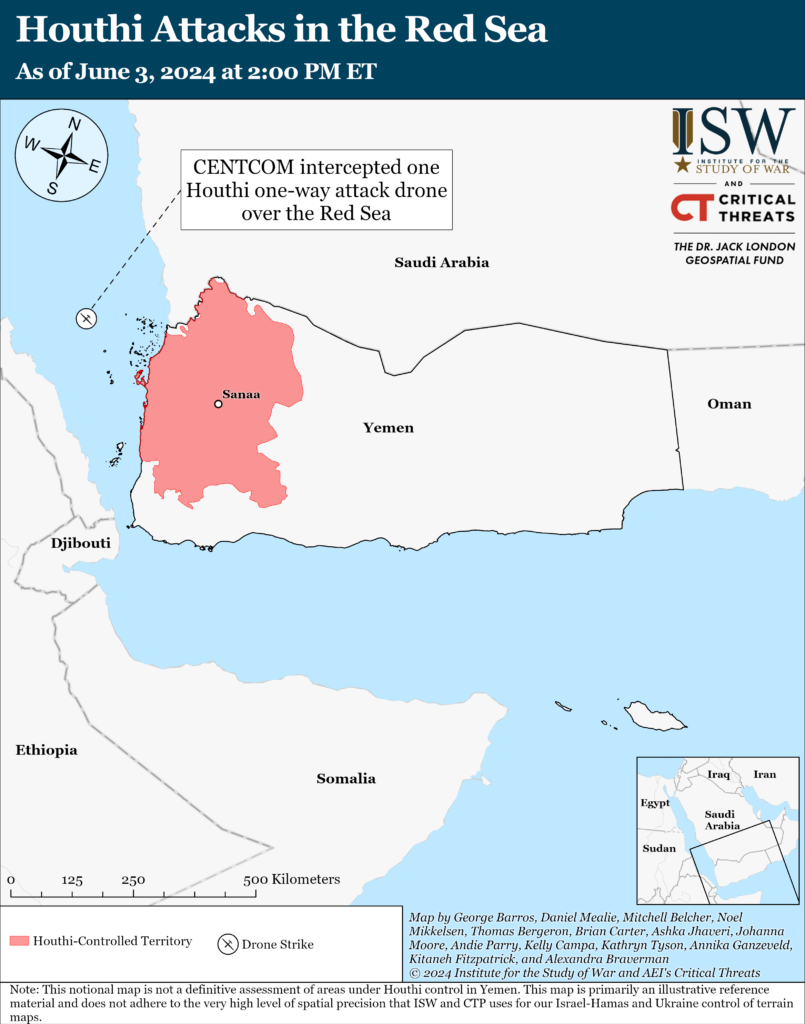
 Eurasia Press & News
Eurasia Press & News



